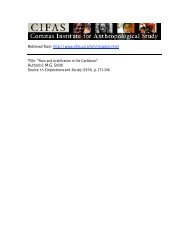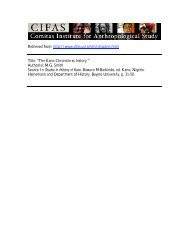Slaves, Free Men, Citizens - CIFAS
Slaves, Free Men, Citizens - CIFAS
Slaves, Free Men, Citizens - CIFAS
- No tags were found...
You also want an ePaper? Increase the reach of your titles
YUMPU automatically turns print PDFs into web optimized ePapers that Google loves.
28 Socialization and Personality StructureFilly came the long period of seasonhg. The slave wastaken to the estate, branded with a silver brand heated inspirits, and given a name." What took place after thisvaried from one estate to the next. On most estates theofficial period of seasoning was three years but in actualpractice the period was usually restricted to a year. Beckfordwrote that there were two basic forms of seasoning,that in which new Negroes were put under the supervisionof elderly seasoned slaves from their own country; andthat in which the master assumed primary responsibilityfor their safeguard, keeping a provision ground 'readyplanted, full of provisions, and apportioned to them upontheir arrival'.*S The first type of seasoning often led totyranny on the part of the supervising slaves, the latterforcing his ward to work his ground for him at the expenseof the ward's ground, and this neglect was often responsiblefor leading the new Negro to steal in order to preventhimself from starving.29 Edwards, however, paints abrighter picture of the relationship between the new Negroesand their wardens, claiming that old seasoned Africansusually avidly sought after newcomers from theirhomeland with whom they could revive memories of theiryouth and whom they sometimes adopted.30 But this isquite likely a gross overstatement27 African slaves were often ghn names taken from popularliterature or the Greek classics. On Rose Hall estate there were:Hannibal, Ulysses, Scipio, Hercules, Othello, Antony, Mark, etc.28 W. Beckford, Remark* upon the Situation of the NegroesIn Jamaica (London, 1788), p. 27.30 H. Coor, in Minutes of the Evidence Taken before a Cornmitteeof the House of Commons . . . respecting the Afri~mSlave Trade. 1790-91. House of Commons Sessional Papers,Vol. 34.Â¥"Edwards op. cit., Bk. 4, pp. 155-56. Thia passage readsnnconvincingly, like so many of Edwards' remarks conecrnhgthe slaves. Slave fathem had little control over their sons, and,as a rule, cared even less about them. They certainly would nothave gone out of their way to seek suitable wives among thenew Negroes for them. But there may have been some trothin the other remarks relating to the relationship between newlyarrived slaves and their supervisors.Orlando Patterson29The disadvantage of the second type of seasoning, aocordingto Beckford, was that it led to discontent and feelingsof injustice among the new Negroes since they wereforced to work on Sundays on the grounda prepared forthem, not of their own free will, but under the supervisionof a driver. Some masters got around this problem bysimply allowing the new Negroes one year's provisions fromthe stores.What of the personality of the Africans in these firstfew months on the island? Beckford has left us a pcnetratingaccount of them which strongly suggests all thesymptoms of a broken trauma-ridden personality. Theywere cold. unfeeling and completely unpredictable, theirgeneral attitude being one of total indifference:It is amazing to see how little they interest themselvesin the common occurrences of life; they do not foreseethe want of means, are careless of what may happen andthoughtless of what they have; in short, their charactersfor many years after their arrival can hardly be definedby the most perspicacious eye of those by whom theyare governed, so that for what we know they may behappy when silent or dangerous when sullen.alThe Seasoned African Slave. By the time the African'speriod of seasoning was over he was sure to find himselfdefined in a certain social position and drawn towards certaingroups. During the early period, when the Africansformed the majority of the slaves, divisions between thedifferent African tribes were as great as that between theAfricans as a whole and the creoles. Leslie wrote that:The slaves are brought from several Places of Quincy,which are different from one another in Language, andconsequently they cannot converse freely; or, if theycould, they hate one another so mortally, that some ofthem would rather die by the Hands of the English, than'1Beckford, op. cit., p. 88.





